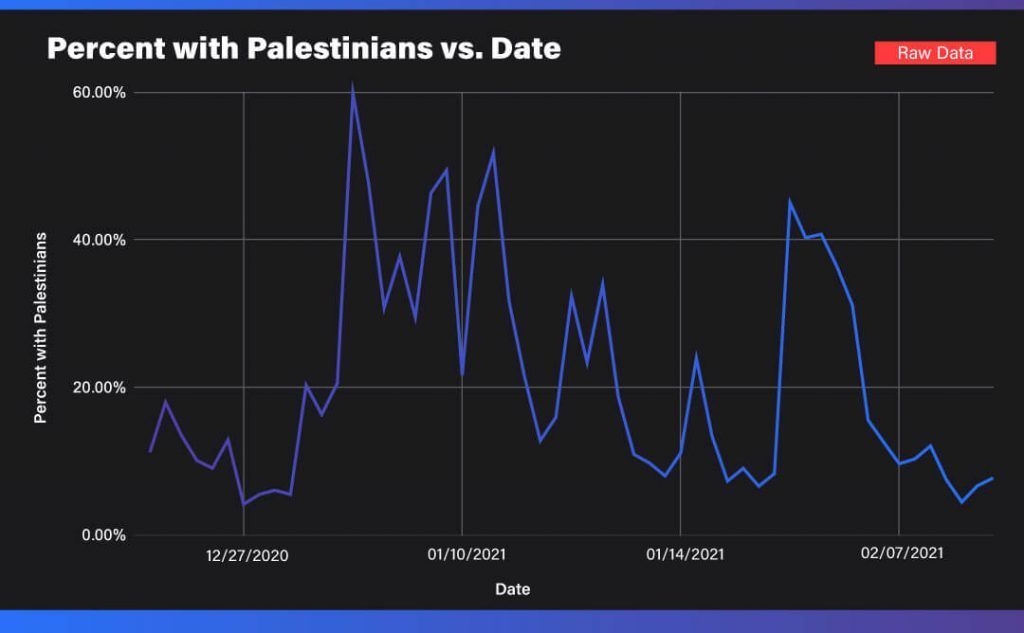Over 92% of global news articles and social media posts regarding Israel’s world-leading coronavirus vaccine drive have stopped mentioning the Palestinians at all. The false, if not malicious, narrative that the Jewish state is withholding inoculations from Ramallah has been dramatically curbed: down from just shy of 60% of items globally at the beginning of January to less than 8% as of publication of this piece.
To be clear, the total number of stories on this topic has not decreased, remaining constant at about 4,000 to 5,000 per day, but the percent of those stories that mention Palestinians has decreased. In other words, the news cycle did not merely fade away, but in fact fundamentally changed over time.
This might seem surprising to Israel supporters. After all, when a news story seems unfair or infuriating it can draw our focus away from the broader picture. But “big data” depicts the true reality, and an exceptional one at that.
Join the fight for Israel’s fair coverage in the news
How do we know?
This year, HonestReporting developed the capacity to harness the power of “big data,” examining hundreds of thousands of articles and social media posts in real time. (For those unfamiliar, “big data” is a term used to describe the use of large data sets to identify major trends in complex situations, a tool best known for its use in social media advertising.) And we can see a clear trend: In early January, 59.91% of all stories and social media posts about Israel’s vaccine effort discussed Palestinians — and now only 7.71% do.*
The chart below shows the pronounced effect. Specifically, this is a 15 day “moving average,” a tool used by professionals ranging from data scientists to stock traders in order to organize complex information and identify underlying trends. We have superimposed the dates when HonestReporting did its work, which helps us to identify our role in impacting the overall media conversation worldwide, and to build strategy accordingly.
*The 59.91% and 7.71% figures are visible in the raw data in the second graph, but not within the moving average data.

Such a consequential development begs the question: What happened to alter the conversation?
Palestinian Vaccine Blood Libel Goes Viral, HonestReporting Goes to Work
In late December, as Israel rolled out a major initiative to vaccinate the country’s population against COVID-19, Reuters, Associated Press, The New York Times, The Washington Post, CNN and ABC News, among other outlets, plastered headlines implying or outright declaring that Jerusalem was responsible for the Palestinians’ purported lack of access to vaccines. Some even claimed Israel was violating international law or enacting a system of “medical apartheid.”

New York Times, February 8, 2021
In response, HonestReporting took action. On December 21, we published a piece, Media: Israel Leaves Palestinians Waiting For Vaccines; Truth: Palestinians Never Asked Israel for Help, which painted an accurate picture of the situation on the ground. The same day, our MediaCentral project quickly organized a press conference, Inside Israel’s COVID 19 Vaccination Drive, which featured Prof. Jonathan Halevy.
And we were just getting started. On January 7, January 19 and February 2, HonestReporting published additional fact-based rebuttals to the anti-Israel narrative. Meanwhile, MediaCentral held a series of teleconferences on December 23, January 5, January 16, January 21 and February 11 that immediately provided local and foreign journalists with truthful information about the latest developments regarding the Jewish state’s efforts to curb the pandemic.
Our multi-pronged approach also included calling out the media on its own turf. On January 11, Newsweek published an article by HonestReporting CEO Daniel Pomerantz, Here is What America Can Learn from Israel’s Vaccination Triumph. In addition, he appeared in television segments on Voice of America News (January 13), and RT News (February 8).
Results? The data speaks for itself
Over the approximately two months since Israel began its vaccination campaign, HonestReporting has tracked 403,662 articles and social media posts. During that period, the total percentage of related stories that included discussion of Palestinians has dropped from a high of 59.91% on January 3 to 7.71% on February 14. Note that the raw data shows a pattern that data professionals call “lower highs and lower lows,” indicating a clear trend that is even more evident in the moving average.

The figures allow us to identify a correlation between the work done by HonestReporting/MediaCentral and the huge reduction in stories across a wide spectrum of media platforms that could have tarred the Jewish state’s image despite the Palestinian leadership’s missteps in procuring inoculations for its own people.
Of course, as the saying goes, “correlation does not prove causation,” and there may be additional factors at play. But using a “big data” approach, we can clearly identify the major trends and see precisely when and how our work fits into those trends. This allows us to precisely focus our timing and efforts to achieve maximum impact, for Israel and for Jewish communities across the globe.
We know from speaking privately to journalists that we are having an impact on the way they view and write about this story, and it is partly attributable to our increasingly proactive approach: in addition to our core work of achieving media corrections after biased articles have already been published, we are also influencing the way that journalists report about Israel from the onset.
But while the Israeli vaccination narrative has seemingly turned a corner, the battle against anti-Israel bias and online antisemitism continues.
The good news is that we are now better positioned to directly hold news outlets to account whenever they cross the red line marking the boundary between responsible and accurate reporting and anti-Israel advocacy.

